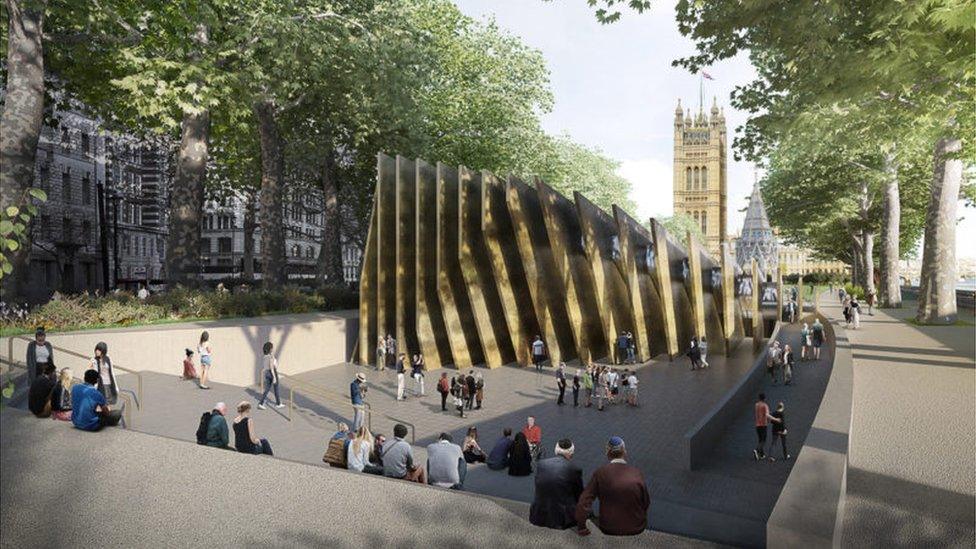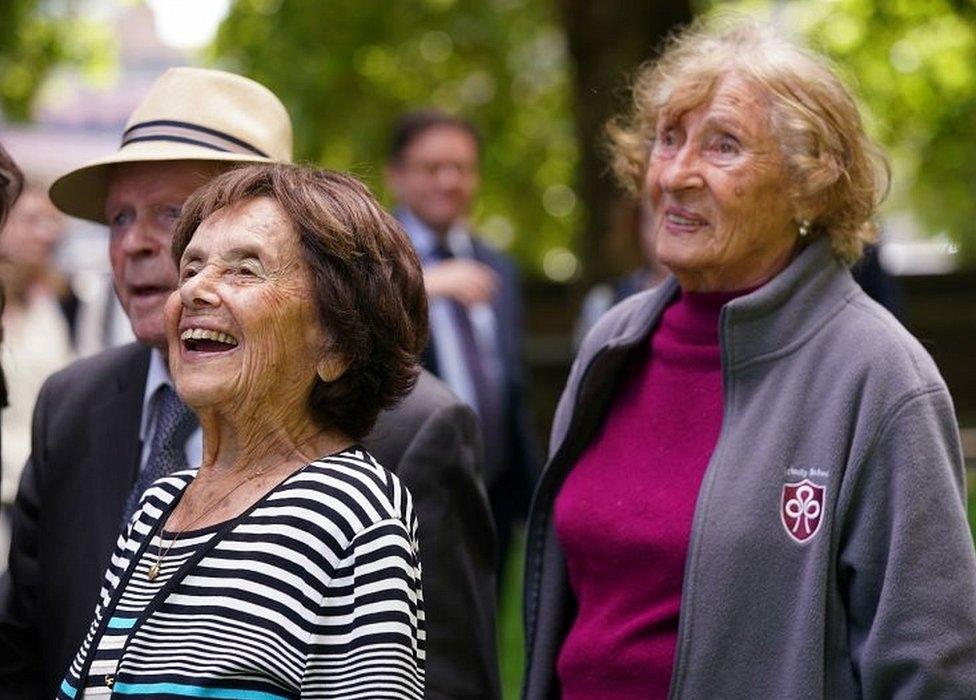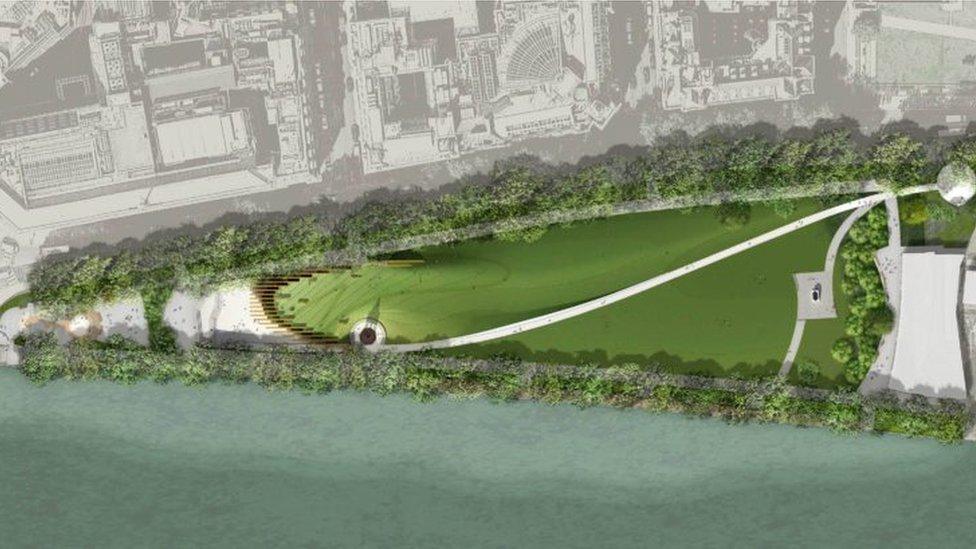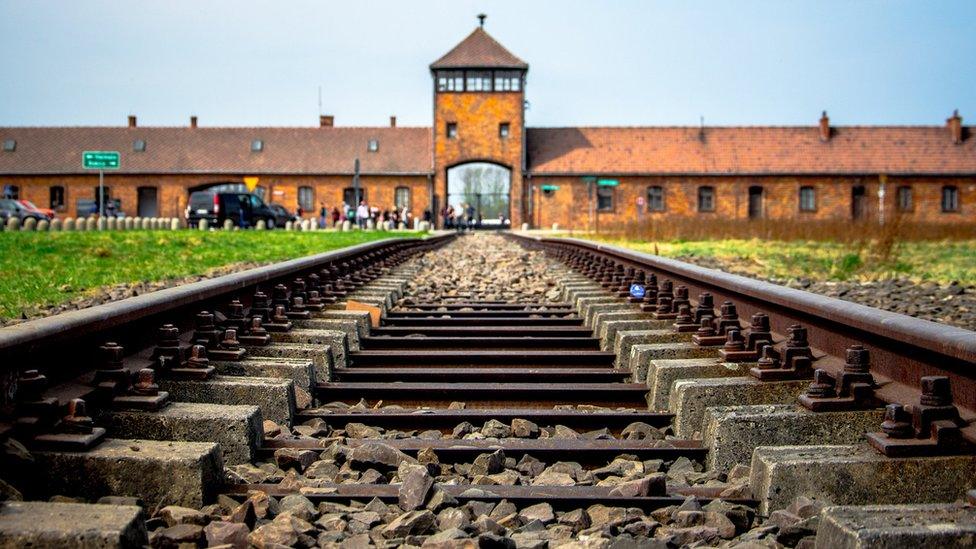Holocaust memorial outside Parliament to go ahead
- Published

The memorial is to be built on the green next to the Palace of Westminster
The government has given the go-ahead for a Holocaust memorial to be built next to the Houses of Parliament.
The plans, including 23 large bronze sculptures and an underground learning centre, were previously rejected by Westminster Council.
The decision has been overturned following an inquiry.
The Board of Deputies of British Jews said it was "delighted", but concerns have been raised that the site could become a target for terrorists.
However, the government said it was confident the memorial, to be built on Victoria Tower Gardens with work starting later this year, would be secure.
Former Prime Minister David Cameron announced plans for the project in 2016, but it has been beset by disagreements over its meaning, as well as public safety and possible harm to parkland.
The Save Victoria Tower Gardens campaign group said it would appeal against the Ministry of Housing, Communities and Local Government's (MHCLG) decision.
One of its leaders, crossbench peer Baroness Deech, said the memorial would be "divisive", adding: "We passionately believe that the Holocaust should be remembered, but we believe that this ill-considered and damaging proposal will do a disservice to victims and survivors, and little to enhance understanding and respect."
The MHCLG ruled in favour of it going ahead following a public local inquiry into Westminster Council's original decision.

'We can show the world what happened'

Lily Ebert (centre-left of picture) with fellow Holocaust survivors Sir Ben Helfgott and Susan Pollack
Among those attending an event in Victoria Tower Gardens to commemorate the decision to give the go-ahead to the Holocaust memorial was Lily Ebert.
In July 1944, Hungarian-born Lily was deported, aged 14, to the Auschwitz-Birkenau extermination camp in Nazi-occupied Poland, where her mother, younger brother and younger sister were sent to the gas chambers.
"It is a big achievement for us that we are here and we can show the world what happened, that we survived," she told the BBC.
"It's a beautiful occasion, with people here. We feel that we can build something that is not only for us, but for our children and grandchildren, so we will not forget what happened."

Prime Minister Boris Johnson welcomed the decision tweeting:, external "We have a duty to ensure that the Holocaust is never forgotten and that it will continue to be taught to future generations."
Communities Secretary Robert Jenrick told the BBC the memorial and learning centre would "educate and inform future generations about the horrors of the Holocaust" and that he hoped millions of people would visit it every year.
He added that it would also foster a better understanding of "the British role in the tragedy - the things we did right and we did wrong".
And Labour leader Sir Keir Starmer backed the project, arguing it was "vital" in educating future generations about the Holocaust.
Marie van der Zyl, president of the Board of Deputies of British Jews, said: "There will be something uniquely powerful about locating a memorial to the Holocaust right next to the centre of the UK's democracy.
"Whilst the Holocaust was a particular crime against Jewish people, the Nazis also viciously persecuted Roma, gay and disabled people, and this memorial will speak to that."
She added: "The messages and learnings that one should glean from its memorialisation are a powerful reminder of the universal values of fairness and justice that a democratic society has the responsibility to bestow upon its citizens."

The proposed plans feature 23 large bronze fin structures and an underground learning centre
Some Jewish leaders have voiced their concerns about the memorial.
Six million Jewish men, women and children and other victims were murdered by the Nazis during the Second World War.
- Published21 February 2019

- Published10 February 2019

- Published21 January
